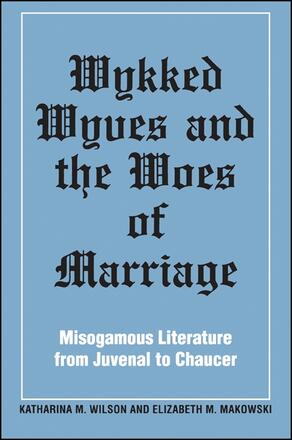
Wykked Wyves and the Woes of Marriage
Misogamous Literature from Juvenal to Chaucer
Alternative formats available from:
Analysis of the literature demonstrates a link between the growing secularism and careerism of the late middle ages and the reduction of women’s social status and public options.
Description
The distrust and hatred of matrimony is a recurring theme in Western literature. In this volume, Wilson and Makowski show that in their repeated imagery, continuous themes, and rhetorical devices, misogamous texts closely parallel and reflect economic and demographic shifts, and theological and legal innovation. Analysis of the literature demonstrates a link between the growing secularism and careerism of the late middle ages and the reduction of women's social status and public options.
Katharina M. Wilson is Associate Professor in the Department of Comparative Literature at the University of Georgia. Elizabeth M. Makowski is in the Department of History at Columbia University.
Reviews
"The chief virtue of the study is that it makes accessible for the first time a huge and miscellaneous tradition which is absolutely crucial to medieval scholarship and to both medieval and general feminist studies. Because it is focused on texts, meticulously paraphrasing them, it provides a lucid witness to the facts of the tradition, to the prevailing winds of influence, and to the shifts in the tradition as the writer fits it to his personal cultural agendas. It is impressively researched and the logic of its historic and literary analysis is so impeccable that the contrast between pristine method and nasty content is sometimes delightful. " — Elizabeth P. Armstrong, University of Cincinnati